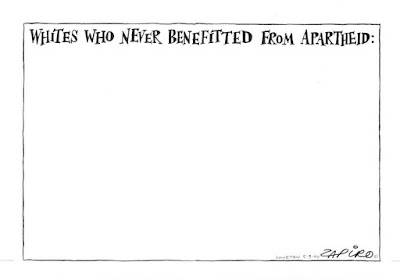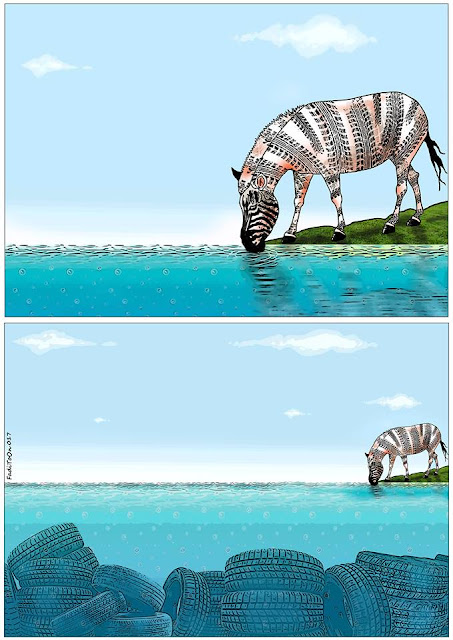"Out to listen"
 |
| Zapiro, September 5, 2000. As simple as it can possibly be - and as forceful in meaning. |
Two cartoonists ever curious, open-minded and intellectuals of the world.
This is crucial in that their art is reflective of what they embody. Their ever curious and critical disposition, their listening in on the world, define how they tune their art.
Riber Hansson has reflected on the element of a moral obligation to their working process. That with freedom of speech comes the responsibility to take in before speaking. With freedom of speech there is potentially many levels of information at hand to be evaluated critically and hence it is not just our duty to speak, but to speak from a basis of knowledge and observation.
This is strangely controversial right now in countries with a solid freedom of speech. Obligations of any kind are seen as way of diminishing the freedom on hand, especially as a regression back to the days when only a few were allowed to speak out. A sort of fabricated fight then takes place with the declared combatants posing as warriors of freedom and the look at me moral glorification it entails while de facto leading the attention away from the actual problems at hand.
 |
| Riber Hansson, Freedom of speech. With freedom of speech as a pre-condition for democracy, this is the visualization of "democracy" in Russia. |
A piece of propaganda has always been of use on both sides of a conflict, when the opponent brags of being perceived as a scary monster by the other side. But there are cartoons out there so poorly composed they say the opposite of what was intended.
I have called it the acid test of cartooning: The Assad Test, how to prove whether a cartoon misses its point. Whenever that is the case, let them justifiably be forgotten.
Then there is of course that number of cartoons, the sole purpose of which is to mock. We should just call them for what they are and let us pat all of the weak and mocking ones on their imaginary heads while we pass them by to focus on the core of the profession of cartooning, put so well by Angel Boligán earlier this year:
"There is an imaginary line, and within it, our opinions are credible, however forceful they are. If we pass this line to the brutality of unjustified aggression, we run the risk of losing credibility."
 |
| Zapiro, November 22, 2011. When actively obliterating his own actions, President Zuma is undermining democracy. His showerhead for a halo can never again be unseen. |
When the cartoonists take care not to pass the line, we should and ought do no less. In the media hype we forget to laud those very cartoonists, who fight every day.
The activist-cartoonists, who are truly under pressure, physically and verbally, and yet they would not dream of doing anything less than their best. Zapiro will say that his activist days are a little behind him, but his cartoons tell a different story.
He is under as severe a political pressure as before, in fact much more so now, working on his moral outrage "and I have the platform" as he says. He would not even think otherwise. That is moral obligation at its strongest.
It is an inspiration.
 |
| Zapiro, May 27, 2016. The epitome of the great cartoonist. |


